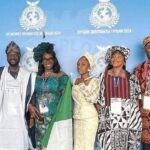By Chuks Oyema-Aziken
The United Nations Development Programme, UNDP, on Tuesday launched and unveiled the 2023-2024 Human Development Report (HDR) in Nigeria, saying human development remains low at 0.548 – placing the country in a low human development category.
In her speech at the unveiling with theme “Breaking the Gridlock: Reimagining Cooperation in a Polarized World”, Ms. Elsie Attafuah, Resident Representative, UNDP Nigeria noted challenges facing mankind across the globe.
“Deaths from violent conflict and displacement are increasing – reaching the highest levels since World War, Temperatures are rising – with 2023 being the hottest temperature ever recorded. Inequalities are widening between countries at the bottom and countries at the top of the HDI,” she said.
She further noted that their is a feelings of stress, insecurity, sadness, and anxiety are also rising, reaching its highest levels since the Gallup surveys began.
“New analysis in the HDR using data from the World Values Survey shows that only half of the global population feels in control of their lives and that only one-third of people believe that their voice is heard in their political system.
“A world in which the gap between the rich and the poor are widening, posing a threat to human development. A world in which we see increasing polarization that pulls us apart and stops us from working together. A world in which the Sustainable Development Goals (SDGs) are off track to meet the targets we set for 2030.
She said the report is an invitation to reimagine cooperation by pursuing three ideas that it encourages the world to fight for.
“Lower tensions and push back on the divide hindering cooperation. To do that, we must intentionally create spaces of deliberation to bridge divides. Addressing agency gap in policies and norms to empower individuals in pursuing their legitimate and innate aspirations and Constructing a 21st century architecture for international cooperation to deliver global public goods—from climate change mitigation to pandemic preparedness to biodiversity preservation as well as the digital public infrastructure– that would be harnessed for people to flourish in more equitable ways.
-Macroeconomic changes takes time to yield benefits – Edun
In his keynote address at the event, Minister of Finance and Coordinating Minister of the Economy, Mr. Wale Edun took stock of ongoing economic reforms by the present administration, and said macroeconomic changes takes time to get the benefits.
The Minister noted that the HDR is a rallying cry that charts a way forward for conversations on reimagining development cooperation for a better world.
“In re-imagining cooperation, international financial architecture ought to be structured to proactively support the implementation of the Sustainable Development Goals (SDGs) and the realization of human rights. The only way to facilitate such a structure is through ambitious reforms, starting with more inclusive, representative and, ultimately, more effective global economic governance.
Earlier, the UN Resident and Humanitarian Coordinator, Mr. Mohammed M. Fall noted that Inequalities are rising between and within countries.
He stressed the need for multi-lateralism and solidarity among nations to address these challenges.
“Even access to food is becoming a major challenge for many and the climate crisis in making all these scenarios worse. Studies are showing decreased trust in public institutions by the people. Many people continue to feel that their voices are not heard.
“The young people are getting more restless as they face the challenges of unemployment and limited opportunities. It is now time to act before the global path to human development and peace falls to a level difficult to rescue. And for our planet to be safe for future generations, we have an obligation to get back to the path of rescuing and accelerating the achievement of the SDGs.
“Nigeria is a very important country in our sub region, the continent and the world at large. If Nigeria succeeds, which we know is very possible with hard work and political will, it will a be a success not only of the continent but the entire world.
“Let’s face it, the challenges faced by Nigeria are not unique to this country. Other countries face similar issues as well – the drastic impact of COVID 19 pandemic, climate crisis, conflict, debt distress, inadequate financial architecture and food insecurity.
“In these times, multilateralism and solidarity among nations is the key to address these challenges.
“It’s a call to capitalize on our local and global connections. It’s a call to choose cooperation, multilateralism and solidarity over conflict and unilateralism. It is also a call to construct a 21st century architecture for international cooperation that can deliver global public good.”



